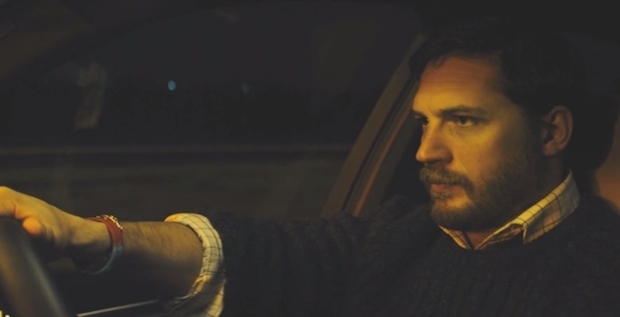The ancients thought that the seat of female hysteria was the womb. My theory (just as credible) is that male charisma resides in the neck.
The most magnetic films stars have always had impressive upper spines. Marlon Brando’s neck was so thick it was simply a continuation of his temples with only a jutting chin to betray the difference. While James Dean’s sudden bare nook between hair and leather collar is the definition of sexy vulnerability. Tom Hardy, one of the most exciting actors of the moment, is just as well endowed. His neck, playing the serial killer in Nicolas Winding Refn’s Bronson and a charming forger in Christopher Nolan’s Inception, was in constant danger of overshadowing his head (not to mention the other actors on screen). When casting him again in Batman, Nolan made damn sure Bane’s mask was sufficiently revealing to flaunt his star’s best asset.
In his latest film, Hardy appears only from his shoulders up. He plays Locke, a construction site manager, who has to drive from Birmingham to London in what is obviously a deviation from his normal routine. The change in plan forces him to stand up his family who are waiting for him at home to watch the football and to guide an inept colleague through preparations for the ‘biggest concrete pour in Europe’ while trying to calm down the woman, who is not his wife, frantically awaiting his arrival. For 80 minutes, we watch his life unravel on the phone.
As scriptwriter for Stephen Frear’s Dirty Pretty Things and one of the brains behind Who Wants to Be A Millionaire?, the director Stephen Knight knows how to do clever and compelling. The setting is both a proven gimmick to ratchet up tension (a variation on Hitchcock’s Rope or that film where Ryan Renolds spends 95 minutes in a grave) but also ensures the film has to observe classical unities of time, place and action. This is tragedy and the common man. It is a shame then, given Locke’s claustrophobic downward spiral, the ending feels like a cop-out.
As if space constraints weren’t challenge enough, Hardy takes it upon himself to affect a Welsh accent. There seems to be rhyme but no reason behind this. Perhaps it’s to tone down his sex appeal (Welsh is without a doubt the least sexy of regional accents) and to echo the lulling rhythms of the passing cars and undulating lights in the night. Like a lullaby, his voice is as soothing as it is menacing. He constantly seems to be on the verge of a breakdown (mental) as he riffs poetically about the stability of concrete or jabbers away at his dead father’s ghost, located somewhere on the back seat. In the end, however, the accent is just distracting. And somewhat less satisfying, than finally guessing which disembodied voice belongs to Olivia Coleman.
It’s so short and sharp, you don’t notice it’s slightly contrived. Either way Hardy is mesmerizing as the everyman trying to save his job, his marriage and his neck.






Comments